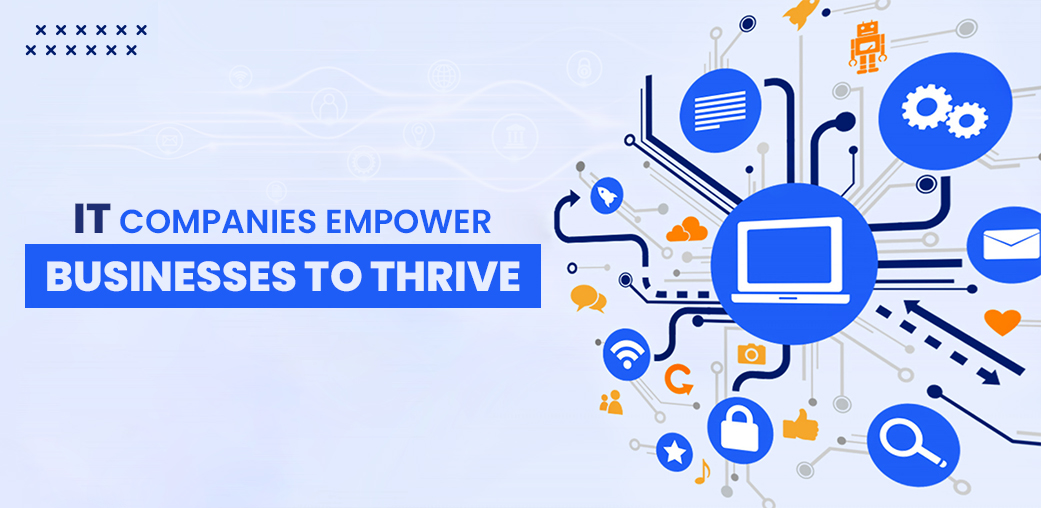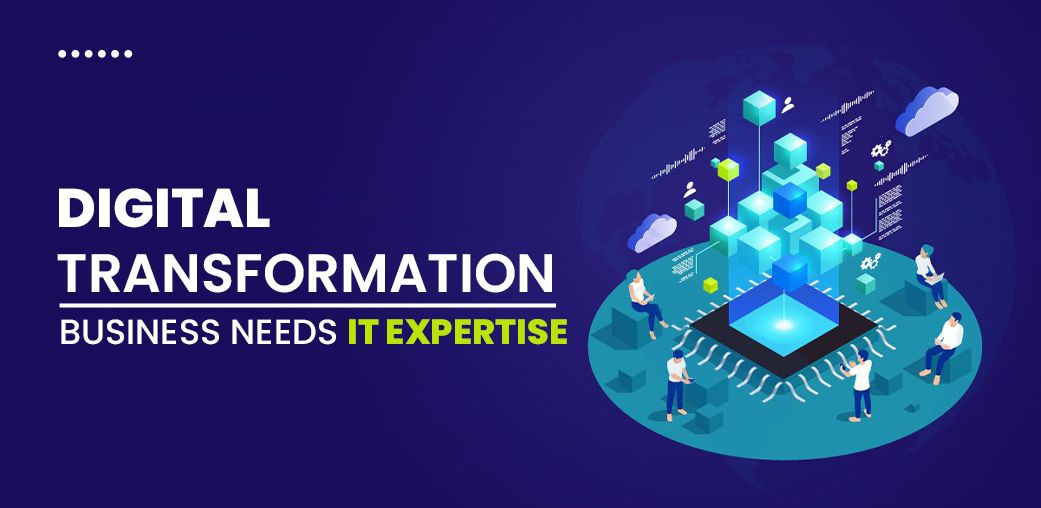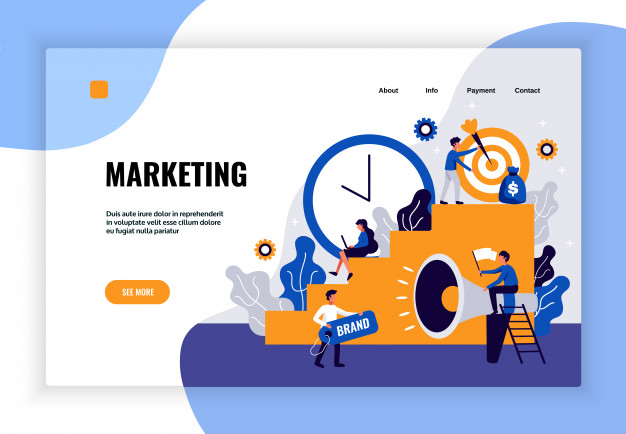The Future of IT in Business: Trends and Predictions
Introduction
In today’s fast-changing world of business, information technology (IT) is super important. It helps organizations work better, come up with new ideas, and be competitive. As we move ahead in a more digital and connected world, it’s really important to check out the things that will define the future of IT in business.
1. Artificial Intelligence (AI) and Machine Learning (ML)
AI and ML are already making big changes in many industries, and they’re going to keep getting more important for businesses. Things like predictive analytics, chatbots, and automation are changing how things work. In the future, companies will use AI to make decisions based on data, make customers happier, and make their operations work even better.
2. 5G Connectivity
The arrival of 5G networks means really, really fast internet and less waiting, which is great for businesses. With this tech, we can send data instantly, making remote work better and helping stuff like smart devices (IoT) grow. Places like hospitals, shipping, and making things will especially like how 5G helps things happen quickly and smoothly.
3. Edge Computing
Edge computing is becoming more popular. It means doing computer stuff closer to where the data comes from instead of far away in big data centers. This helps things work faster and makes Internet of Things (IoT) devices work better. It’s great for things like self-driving cars and smart cities. Companies will start using edge computing more to quickly process data and make better choices.
4. Cybersecurity
As businesses use more computer related things, it’s really important to keep them safe from bad computer people or hackers. These people keep coming up with new ways to do harm, so companies have to be smarter and protect themselves. In the future, businesses will use fancy computer tricks like AI to spot threats, not trust anyone too much, and make sure their secret stuff is super locked up.
5. Cloud Computing
The cloud has already changed how businesses save and handle information. In the future, cloud computing will keep getting better with new edge cloud and hybrid cloud options. These will let companies be more flexible and grow their computer systems while still keeping a grip on their data.
6. Blockchain Technology
Blockchain, which is famous for its use in digital money like Bitcoin, isn’t just about money. It can also be used to keep things safe and clear when we want to check or prove something. This can be really helpful in making sure things go smoothly in businesses, healthcare, and even when we vote. As blockchain gets better, companies will find new and smart ways to use it in what they do.
7. Remote Work and Collaboration Tools
The COVID-19 pandemic made more people work from home and use online tools to work together. Even when things get better, working from home will still be common. Companies will spend money on better online tools, like virtual reality, to help people work together, even if they’re far apart.
8. Sustainability and Green IT
Sustainability isn’t just a trendy word; it’s something that both businesses and people care a lot about. Computers and technology will be really important in helping companies use less energy and be kinder to the environment. Things like eco-friendly computer rooms, using clean energy for computers, and using green tech will become normal as businesses try to be more sustainable.
9. Data Privacy and Compliance
Because of strong rules about keeping information private, like GDPR and CCPA, companies must focus on keeping data safe and following the rules. Having strong plans and technology to manage data properly is really important. This will help them avoid big fines and keep their customers’ trust.
10. Human-Machine Collaboration
The future of IT isn’t about replacing people. Instead, it’s about making people even better at their jobs. Companies will start to work more with computers and robots, and together, they’ll be super good at getting things done and thinking up new ideas.
Conclusion
The future of IT in business looks really good, and there are lots of exciting chances for improvement. To stay competitive and strong in the fast-changing digital world, it’s important for businesses to adopt these new ideas and forecasts. Companies that spend in AI, 5G, edge computing, cybersecurity, and eco-friendly practices will do well and be at the front in the digital era. As we go ahead, the important things for success will be the ability to adjust, come up with new ideas, and really understand how IT can help a business grow and work better.
The Digital Backbone: How IT Companies Empower Businesses to Thrive
If we talk about today, the role of IT companies has become more critical than ever. They are the architects and custodians of the digital backbone that underpins the success of businesses across industries. From enabling seamless operations to fostering innovation, they have emerged as the driving force behind business growth and resilience. Here, we will explore how companies empower businesses to not just survive but thrive in the digital age.
1. Unleashing Operational Efficiency
One of the primary ways of them is optimizing their operations. Through the implementation of cutting-edge technologies like cloud computing, automation, and data analytics, they help streamline processes, reduce manual intervention, and minimize errors. This not only improves productivity but also frees up valuable human resources to focus on higher-value tasks.
Moreover, they often provide tailored software solutions like CRM software and enterprise resource planning (ERP) systems that enable companies to manage their resources efficiently, monitor performance in real-time, and make data-driven decisions. This level of operational efficiency is essential for staying competitive in today’s fast-paced business environment.
2. Enhancing Customer Experiences
In an era where customer experience can make or break a business, IT companies play a pivotal role in helping them to deliver exceptional service. Customer relationship management (CRM) software, chatbots, and personalized marketing strategies are just a few examples of how they empower businesses to create memorable interactions with their customers.
These technologies enable them to understand their customers’ preferences, provide instant support, and offer tailored recommendations. As a result, customer satisfaction and loyalty levels soar, driving revenue growth and long-term success.
3. Enabling Data-Driven Decision-Making
Data is often referred to as the new oil in the digital age, and IT solutions are the drillers and refiners. They develop robust data analytics solutions that allow ventures to gather, process, and analyze vast amounts of data from various sources. This data-driven approach empowers organizations to make informed decisions, identify trends, and seize opportunities swiftly.
Furthermore, experts assist in implementing robust cybersecurity measures to protect this valuable data. In an age where cyber threats are ever-present, safeguarding sensitive information is paramount for business continuity and trust-building.
4. Fostering Innovation
Innovation is at the heart of industry growth, and experts are the catalysts that drive it. They assist businesses in adopting emerging technologies such as artificial intelligence (AI), the Internet of Things (IoT), and blockchain, which have the potential to revolutionize industries.
These innovations open up new revenue streams, improve product offerings, and enhance competitiveness. They often provide research and development support, helping to stay ahead of the curve and lead in their respective markets.
5. Scaling for Growth
As businesses expand, their IT needs grow in tandem. The companies offer scalable solutions that can adapt to the changing requirements, whether they are small startups or large enterprises. Cloud computing, for instance, allows companies to scale their infrastructure on-demand, reducing the need for hefty upfront investments in hardware and software.
By providing flexible IT solutions, they ensure that businesses can easily expand their operations without experiencing technological bottlenecks.
Conclusion
The digital backbone created and maintained by IT companies is the bedrock upon which modern businesses thrive. Their contributions go far beyond just providing technical support; they are strategic partners in the journey towards business success. From optimizing operations to fostering innovation and enhancing customer experiences, they allow businesses to not only survive but also flourish in the dynamic and competitive landscape of the digital age. As technology continues to advance, the partnership between businesses and IT companies will only become more crucial in shaping the future of commerce.
Digital Transformation: Why Every Business Needs IT Expertise
In today’s fast-paced and interconnected world, the term “digital transformation” has become a buzzword across industries. Whether you run a small startup or a multinational corporation, embracing digital transformation is no longer a choice but a necessity for survival and growth. However, one crucial aspect often underestimated is the need for IT expertise within every business. Here, we’ll explore why every business, regardless of its size or industry, needs expertise to successfully navigate the journey.
1. Adapting to Rapid Technological Advances:
The digital landscape is constantly evolving with new technologies emerging at an unprecedented rate. From artificial intelligence and machine learning to blockchain and IoT, staying up-to-date with these advancements can be overwhelming for non-technical professionals. The team possesses the knowledge and experience to evaluate which technologies are relevant to your business, ensuring you don’t fall behind competitors.
2. Enhancing Operational Efficiency:
Efficiency is the lifeblood of any business. The experts can analyze your existing processes and systems, identifying areas where automation and optimization can lead to cost savings and increased productivity. Whether it’s streamlining supply chain management or automating customer service, expertise can transform your operations.
3. Securing Your Digital Assets:
Cybersecurity threats are on the rise, and businesses of all sizes are prime targets. Without IT expertise, your company may fall victim to data breaches, ransomware attacks, or other cyber threats. The professionals can implement robust security measures, conduct regular vulnerability assessments, and educate your staff on best practices to keep your assets safe.
4. Leveraging Data for Informed Decisions:
Data is often referred to as the new oil. It’s a valuable resource that, when harnessed effectively, can drive growth and innovation. The team can help your business collect, store, and analyze data, enabling you to make informed decisions. Whether it’s customer insights, market trends, or operational metrics, data-driven decision-making is a cornerstone of successful digital transformation.
5. Meeting Customer Expectations:
In the technical age, customers expect seamless online experiences. From e-commerce websites to mobile apps, businesses need to deliver user-friendly digital platforms. The experts can design and develop these digital solutions, ensuring they not only meet but exceed customer expectations, thereby enhancing your brand’s reputation and customer loyalty.
6. Scaling for Growth:
As your business grows, so do its technology requirements. IT expertise is essential for scaling your infrastructure and applications to accommodate increased demands. Whether you’re expanding to new markets or experiencing a surge in online traffic, the professionals can ensure your technology scales seamlessly.
7. Staying Competitive:
In today’s competitive landscape, businesses that fail to adapt to digital transformation are at risk of becoming obsolete. With the services your organization allows you to stay competitive by capitalizing on emerging trends and technologies.
8. Navigating Regulatory Compliance:
Various industries are subject to strict regulatory requirements, such as GDPR in Europe or HIPAA in healthcare. The specialist can ensure operations comply with these regulations, avoiding costly fines and legal troubles.
Conclusion:
Digital transformation is no longer a choice but a business imperative. To thrive in the digital age, every business, regardless of its size or industry, needs IT expertise. The specialist plays a pivotal role in adapting to technological advances, enhancing operational efficiency, securing digital assets, leveraging data, meeting customer expectations, scaling for growth, staying competitive, and navigating regulatory compliance. By investing in IT masters, you position your business for success in the ever-evolving digital landscape. Embrace the future today, and don’t let your business be left behind.
Exploring Marketplace Business Models that helps to Generate Revenue
In the digital age, the marketplace business model has become a cornerstone of modern commerce. These platforms connect buyers and sellers, allowing transactions to take place with ease. What’s even more intriguing is how these marketplace platforms have evolved to generate substantial revenue for themselves. Here, we’ll delve into some of the most effective marketplace business models that facilitate revenue generation.
1. Commission-Based Model:
One of the most prevalent marketplace business models is the commission-based approach. There are many platforms to employ this strategy. In this model, the marketplace charges a percentage of each transaction made through it. This incentivizes the platform to continually improve the quality of service to attract more users and transactions.
2. Subscription Model:
In a subscription-based marketplace criteria, users pay a recurring fee to access premium features, exclusive content, or a higher level of service. LinkedIn, for example, offers premium subscriptions that grant users advanced networking and job-seeking capabilities. This model fosters a consistent revenue stream, as users are motivated to continue their subscription to maintain access to valuable features.
3. Listing Fees:
Marketplaces use listing fees as a revenue-generation strategy. Sellers pay a fee to list their products on the platform, irrespective of whether the item is sold or not. This approach provides a constant source of revenue for the marketplace, regardless of the actual sales outcome.
4. Freemium Model:
The freemium model offers basic features for free while charging for advanced functionalities. Marketplaces using this technique which often attract a large user base with the free offering and then entice users to upgrade by offering enhanced features or removing certain restrictions through a paid subscription. Dropbox follows this strategy, allowing users to store a certain amount of data for free and then charging for additional storage.
5. Lead Generation Model:
It focuses on services, such as Thumbtack, which often adopt the lead generation model. Service providers pay a fee to receive leads or requests for their services. This approach provides value to providers by connecting them directly with potential clients, making it a win-win scenario and generating revenue for the platform.
6. Advertising and Promotions:
Generating revenue through advertising is a well-established model in the digital realm. Marketplaces can sell advertising space to relevant sellers who want to promote their products or services to a targeted audience. Amazon, for instance, allows sellers to pay for sponsored product listings that appear prominently in search results.
7. Transaction Fees:
In addition to the commission-based model, some places charge a flat fee per transaction. This structure is often employed in combination with other revenue strategies. It works well for lower-cost items or services, as sellers find it more reasonable than paying a percentage-based commission.
8. Data Monetization:
Data is a valuable asset, and some market sectors capitalize on this by offering data-driven insights to sellers and buyers for a fee. These insights can help sellers optimize their product offerings and pricing strategies, and buyers can gain access to market trends and preferences.
Conclusion
In the marketplace business landscape is diverse and ever-evolving. Successful platforms adapt and combine these revenue-generation strategies to cater to their specific market, user base, and industry. By fostering a healthy ecosystem where both buyers and sellers’ benefit, these places can thrive while generating substantial revenue. As technology continues to advance, it’s exciting to anticipate how these models will further transform and innovate in the years to come.
AI in Everyday Life: How Artificial Intelligence is Shaping Our World
Introduction
Artificial Intelligence (AI) is no longer a concept confined to science fiction movies, it has become an integral part of our daily lives, revolutionizing the way we interact with technology and transforming various industries. From virtual assistants to personalized recommendations, it reshaping the world around us in ways we might not even realize. Here, we will explore some of the significant ways AI is impacting our everyday lives and how it is shaping the future.
1. Smart Virtual Assistants
One of the most visible applications of AI in our lives is through smart virtual assistants like Siri, Google Assistant, and Amazon Alexa. These AI-powered companions have become an essential part of our homes, helping us with tasks ranging from setting reminders and playing music to answering complex questions and controlling smart home devices. Through natural language processing and machine learning algorithms, these assistants continue to improve their understanding of our commands and preferences, making our lives more convenient and efficient.
2. Personalized Recommendations
Have you ever noticed how streaming platforms like Netflix, Amazon, or Spotify recommend content tailored to your preferences? That’s AI at work! AI algorithms analyze your past interactions, behavior, and choices to suggest movies, products, or music that you are likely to enjoy. This personalization not only enhances user experiences but also plays a significant role in increasing engagement and customer satisfaction.
3. Autonomous Vehicles
AI is driving us into the future by revolutionizing the automotive industry with the development of autonomous vehicles. Companies like Tesla, Waymo, and Uber are working tirelessly to bring self-driving cars to our roads, promising enhanced safety and convenience. By leveraging machine learning, computer vision, and sensor technologies, it allows the vehicles to navigate complex environments, making decisions in real-time, and reducing the likelihood of accidents caused by human error.
4. Healthcare and Medical Diagnosis
AI is making significant strides in the field of healthcare, from aiding in medical diagnosis to drug discovery. Machine learning algorithms analyze vast amounts of patient data, identifying patterns and making predictions about disease outcomes. AI-powered medical imaging systems can detect early signs of diseases, assisting healthcare professionals in providing accurate diagnoses and timely interventions. Furthermore, it also holds immense potential in speeding up drug development processes, bringing new treatments to patients faster than ever before.
5. Customer Service and Chatbots
In recent years, AI-powered chatbots have transformed customer service interactions. These intelligent virtual agents are capable of handling customer queries and providing support 24/7. By analyzing previous interactions and learning from ongoing conversations, chatbots can offer personalized responses and resolve issues promptly, thus enhancing customer satisfaction and reducing the burden on human customer support teams.
6. Natural Language Processing
Natural Language Processing (NLP) is another remarkable application of AI that allows machines to understand, interpret, and respond to human language. It enables us to communicate with machines more naturally, making text-to-speech and speech-to-text technologies more accurate and user-friendly. It is also powers language translation services, making communication across different languages seamless and promoting global connectivity.
Conclusion
Artificial Intelligence has permeated nearly every aspect of our daily lives, making it more efficient, convenient, and personalized. From smart virtual assistants to self-driving cars, AI is transforming the way we live, work, and interact with technology. However, as AI continues to advance, it is crucial to address ethical considerations and ensure responsible implementation to avoid unintended consequences. As we embrace the potential of AI, it is essential to strike a balance between harnessing its capabilities and safeguarding our values and privacy, creating a future where AI truly enhances our lives for the better.
Struggling With Social Media? Here Are Some Ways To Resolve It.
Introduction:
Social media has become an integral part of our lives, both personally and professionally. It offers numerous opportunities for individuals and businesses to connect, engage, and promote their ideas, products, and services. However, it’s not uncommon to feel overwhelmed by the challenges that come with managing social media platforms. Here we will discuss common struggles faced by users and provide effective ways to overcome them.
- Limited Resources and Time:
One of the biggest challenges of management is finding the time and resources to consistently create and publish quality content. To tackle this issue, consider the following strategies:
- Develop a content calendar: Plan and schedule your content in advance. This helps maintain consistency and ensures you have a steady stream of content ready to be published.
- Repurpose content: Instead of always creating new content, repurpose existing content in different formats or for different platforms. For example, make a series of social media posts or transform a video into a podcast episode.
- Automate and schedule: Utilize tools to schedule posts in advance, freeing up your time for other tasks.
2. Content Creation:
Creating engaging and valuable content is key to capturing your audience’s attention. Overcome content creation struggles with these tips:
- Know your audience: Understand your target audience’s preferences, interests, and pain points. Tailor your content to meet their needs and desires.
- Mix up content formats: Experiment with various content types such as videos, images, infographics, podcasts, and written posts. This keeps your feed fresh and appeals to different audience preferences.
- User-generated content: Encourage your followers to create and share content related to your brand. This not only fosters engagement but also lightens the load of content creation.
3. Brand Knowledge and Differentiation:
In a crowded social media landscape, it can be challenging to stand out and create brand awareness. Here’s how you can differentiate your brand:
- Consistent branding: Develop a cohesive visual identity, including logos, color schemes, and fonts, to create a recognizable brand presence across online platforms.
- Authenticity: Be true to your brand’s values and mission. Share behind-the-scenes content, showcase your team, and tell compelling stories that resonate with your audience.
- Influencer collaborations: Partnering with influencers relevant to your niche can help extend your reach and introduce your brand to new audiences.
4. Audience Engagement:
Engaging with your audience is crucial for building relationships and fostering brand loyalty. Try the following strategies to increase audience engagement:
- Respond promptly: Reply to comments, direct messages, and mentions in a timely manner. Show your audience that their opinions and questions are valued.
- Encourage conversations: Ask thought-provoking questions, run polls or surveys, and invite your audience to share their experiences or opinions.
- Contests and giveaways: Organize contests or giveaways to incentivize engagement. Offer rewards that align with your brand or products to attract relevant participants.
5. Algorithm Changes:
Social media algorithms constantly evolve, making it challenging to maintain organic reach. Stay ahead of algorithm changes with these tips:
- Stay informed: Keep up with industry news, social media blogs, and official announcements to understand algorithm updates and adapt your strategy accordingly.
- Diversify platforms: Don’t rely solely on one platform. Build a presence on multiple platforms to mitigate the impact of algorithm changes on your reach.
6. Measurement and ROI:
Measuring the effectiveness of your efforts is crucial to ensure a positive return on investment. Consider the following measurement techniques:
- Set clear goals: Define specific and measurable goals aligned with your overall marketing objectives. This will help you track and analyze relevant metrics.
- Track key performance indicators (KPIs): Identify KPIs such as engagement rate, reach, conversions, and click-through rates. Use analytics tools provided by each platform to measure your performance.
- Use tracking links: Incorporate unique tracking links in your social media posts to assess the traffic and conversions generated from each platform.
7. Adapting to New Platforms and Trends:
Social media platforms and trends are constantly evolving. Stay adaptable and embrace new opportunities with these strategies:
- Stay curious: Continuously educate yourself about emerging platforms and trends. Attend industry events, webinars, and conferences to stay up to date.
- Test and learn: Experiment with new platforms or features on existing platforms. Test different content formats and track the results to understand what works best for your audience.
- Network and collaborate: Connect with other professionals and stay connected with your industry peers to exchange ideas, insights, and best practices.
Conclusion:
While social media management comes with its fair share of challenges, implementing the strategies mentioned above can help you navigate and sort through the difficulties. By optimizing your time, creating engaging content, building brand awareness, and adapting to changes, you can overcome the hurdles and create a successful online presence for yourself or your business. Remember, consistency, authenticity, and a customer-centric approach are key to achieving success.
Importance of Digital Marketing for Startup’ Growth
Driving growth for a startup may appear to be a difficult task. Utilizing digital channels to promote and market in the current and future pattern. When a startup is set up, the business visionaries need to put resources into advanced promotion because it is a brilliant piece for any startup’s development. It helps in advertising their business as well as pulling in and holding web clients. Here are some legitimate explanations behind the significance of digital marketing for startup development. It is basic to know the importance before you put resources into it.
“Good Marketing Makes The Company Look Smart…Great Marketing Makes The Customer Feels Smart.” – Joebhai Chernov
Digital marketing importance for a startup business:
In this digital platform, it is much hard to succeed in the business without digital marketing. It helps from attracting unidentified visitors to conditional leads to loyal customers. It plays an important role to get your business to succeed at every stage. It is essential and helps from launching a new brand to advertising or promoting an existing as well as a new brand in the market.
Powering your digital dreams, taking your business ahead…!!!
Let’s know its importance and how it helps startups…
It Improves Brand Awareness:
Brand awareness is a priority for any new company. Digital marketing has various ways to give awareness of your brand, through Search Engine Optimization (SEO), the all-time run strategy of digital marketing act as a way to provide stable brand awareness and online presence to any business at the global level. The better SEO you perform, the better rank you’ll get in the search engine results page (SERP). It gives a positive impression on audience minds and your business will get more and more traffic which results in wide reach.
It is Cost-effective:
This is very affordable and gives better results for a business. Digital marketing strategies such as advertising, selling, give information, paid marketing, etc. are cost-effective. Businesses and startups do not require to invest a large amount into it. Furthermore, they can double up the rate of return by investing a little amount in it.
Availability of Statistics:
Digital marketing helps to identify your targetted audience and genuine buyer. For reaching out to your potential customer by not wasting too much time than digital marketing is the best process. With the approach of online marketing and analytics, it is just the best way. We can make the best use of statistics to reach potential customers. It reduces the work efforts and saves your time and money both.
It engages the targetted audience:
Digital marketing has lots of tacts to attract and engage customers to come to your business and take services. You can engage your audience by sharing business and general content with them or by using different social media channels like Instagram, Facebook, YouTube, Pinterest, LinkedIn, etc. through posting.
Availability of Web Results:
It is one of the main constituents, why digital marketing is required on a day-to-day basis. It helps to analyze, plan, measure, report, collect, and divine the activities of a startup or business. The measures that are provided by the analytics tool has become helpful in the customized marketing that is necessary to decide before starting any campaign and get an accurate report that produces better results.
Important decision-maker:
You do not invest your valuable time and money in making the decisions for your business. Digital marketing will assist you and lead you to the right decision and strategy. By splits out their work, they on their own can check which way is better for your business growth. It acts as a decision-maker and takes tests in multiple ways and tactics for better results and profit orientation.
It has plenty of strategies list:
Marketing is a powerful action as it changes as per the business requirements and customers. SEO services, Ecommerce SEO services, Search Engine Marketing (SEM), Social Media Management (SMM), Online Marketing, E-mail marketing, App marketing, PPC management, etc. are few leading tactics that have a unique vision of making a startup grow with their alternative methods.
Benefits of digital marketing for startups:
Digital Marketing Services as a startup help in:
a. Reduce total costs
b. Brand honesty and care
c. Customer maintenance and support
d. Generating appropriate leads
e. Increased rate of conversion and sales and more…
In the end, we can say
In a brief description, digital marketing is the gold for startup extension as it promotes your business around the world. You have to remain online if your audience and customers are online, too reach them. Marketing is just not about reaching your customer or they will reach you. Keep this as your business focus value and invest in it with digital marketing. Visit us as your Social Media Management Company for more details or connect with us for the best startup digital marketing services.






